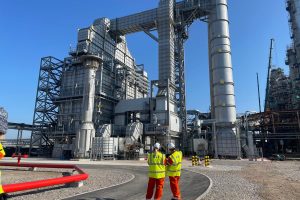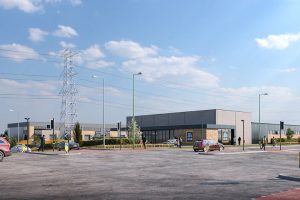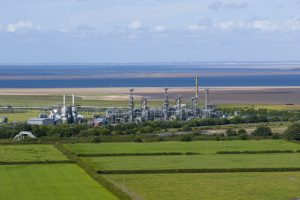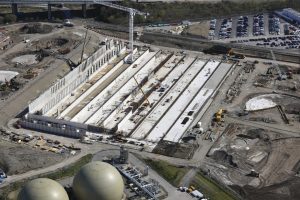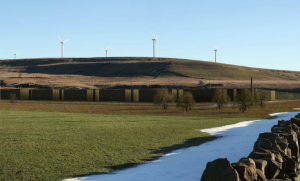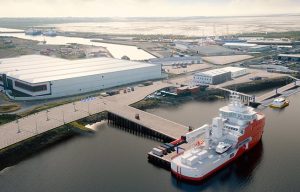North West hydrogen cluster to share in billions of government backing
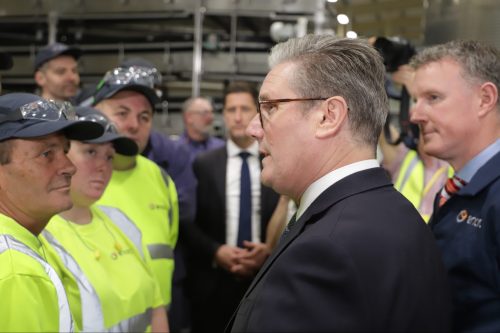
The Government has today (October 4) announced that HyNet, in the North West, has been given the green light, unlocking the decarbonisation of industry and growth across the North West and North Wales industrial heartlands.
It is part of a £22bn pledge, over the next 25 years, for projects to capture and store carbon emissions from energy, industry and hydrogen production, focused on two “carbon capture clusters” on Merseyside and Teesside, which will create thousands of jobs, attract private investment and help the UK meet climate goals.
The significant milestone was officially announced by the Prime Minister, Chancellor and Secretary of State for Net Zero and Energy today at Encirc, an international glass production plant and partner of HyNet, and part of the Spanish-based glass manufacturer, the Vidrala Group.
Bottle manufacturer, Encirc, is situated at Elton, in Cheshire, which will create the world’s first net zero glass bottles at scale, by 2030.
Prime Minister, Sir Keir Starmer, said the move would “reignite our industrial heartlands” and “kickstart growth”.
Encirc managing director, Sean Murphy, said: “The Government’s announcement is a huge step forward for sustainable manufacturers like ourselves, and will help support the journey towards the production of billions of low carbon glass bottles and jars for global food and drinks brands across the UK.
“The regional focus is a sign of confidence for businesses here in the North West.. We look forward to working with UK Government on a range of issues to ensure that the right conditions are in place to enable the sort of inclusive green growth that benefits everyone across society.”
HyNet is a low carbon cluster which will implement carbon capture and storage and low carbon hydrogen infrastructure at large scale, enabling industry to decarbonise.
Delivering HyNet will secure £5bn of private sector capital to enable re-industrialisation of the region, allow companies to successfully compete in international low carbon markets and attract new industries to the UK.
HyNet said it will position Britain as a world leader in the global net zero economy. The creation of 6,000 construction jobs and long term operational roles will build a strong base of skills for those wanting to retrain as well as those beginning their career.
In addition, the region’s economy will be bolstered by a burgeoning supply chain.
HyNet’s blueprint can be replicated across the globe, enabling widespread decarbonisation of hard to abate sectors and allowing the export of skills.
Subsequent phases of HyNet will underpin delivery of the the Government’s Clean Power 2030 mission. This will include hydrogen storage to boost energy security and to fuel flexible power generation, providing us with power when the wind doesn’t blow and the sun doesn’t shine.
HyNet will reduce emissions of carbon dioxide (CO 2 ) produced by industry by up to 10 million tonnes every year – the equivalent to removing four million cars from the road.
David Parkin, Chair of the HyNet Alliance said: “HyNet was formed to meet the demands of industry wanting to decarbonise to deliver sustainable products and compete in the global low carbon economy. We need to decarbonise, not by de-industrialising, but by investing in the industries of the future that we rely on for the everyday products in our lives – from the glass bottles we use for our food and drink to the cement we use to build roads and buildings.
“Government’s commitment to HyNet will also enable generation of resilient low carbon power, right here in the industrial North West and North Wales, supporting its Clean Power 2030 Mission.”
He added: “This will create new roles and safeguard existing jobs, attracting investment and catalysing growth.”

Jane Gaston
Jane Gaston, CEO at Net Zero North West, the industry-led cluster acting as a public and private sector investment accelerator for industrial decarbonisation and clean growth in the region, said: “The deployment of Carbon Capture and Storage and Low Carbon Hydrogen at a large scale will enable us to decarbonise industries such as cement production, hydrogen production, and waste processing.
“By capturing emissions and storing them in depleted gas reservoirs in Liverpool Bay, the region is taking a significant step towards a low carbon future.”
She added: “In the next phase of the project, HyNet will build out the infrastructure required to transport hydrogen to industrial and power generation users across the region and store hydrogen at scale in underground salt caverns in Cheshire. This will not only contribute to the UK’s energy security, but also provide low carbon dispatchable power when renewable energy sources are unavailable.
“We are excited to support HyNet on this groundbreaking project and look forward to the positive impact it will have on the region and the UK as a whole.”
The Encirc initiative is in partnership with global drinks group, Diageo.
It will be powered by zero carbon electricity and hydrogen, from the Vertex (HyNet) plant in Cheshire.
Expected to be fully operational by 2027, the plant, which employs more than 1,000 staff, will produce up to 200 million Smirnoff, Captain Morgan, Gordon’s and Tanqueray bottles annually by 2030.
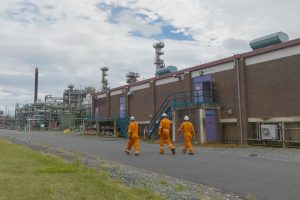
Eni’s Point of Ayr gas terminal
The government’s funding covers the granting of an Economic License for the Liverpool Bay CO2 transport and storage (T&S) project at the Point of Ayr gas terminal.
The project is reusing the depleted reservoirs, operated by Italian energy company, Eni, in Liverpool Bay.
Secretary of State for Energy Security and Net Zero, Ed Miliband, said: “On Monday, 150 years of coal in this country came to an end. Today, a new era begins. By securing this funding, we pave the way for securing the clean energy revolution that will rebuild Britain’s industrial heartlands.
“I was proud to kick-start the industry in 2009, and I am even prouder today to turn it into reality. This funding is a testament to the power of an active government working in partnership with businesses to deliver good jobs for our communities.”
Eni CEO, Claudio Descalzi, said: “Today’s news is an important step towards the creation of a new business chain linked to the energy transition. On our side, it reaffirms Eni’s role as a key partner with the UK in enabling its journey towards Net Zero.”

